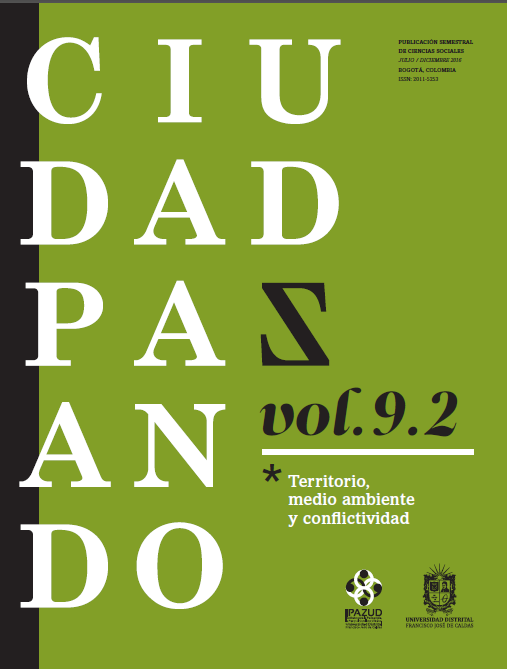DOI:
https://doi.org/10.14483/2422278X.11410Published:
2016-12-26Issue:
Vol. 9 No. 2 (2016): Julio - diciembre. Territorio, medio ambiente y conflictividadSection:
Notas al margenJiu-jitsu en contexto de conflicto armado: el poder de la resistencia no violenta
Jiu-jitsu in the Context of Armed Conflict: The Power of Nonviolent Resistance
Keywords:
Jiu-jitsu, resistencia civil, no violencia, Samaniego (Colombia), conflicto armado, grupos violentos no-estatales (es).Keywords:
Jiu-jitsu, civil resistance, non violence, Samaniego (Colombia), armed conflicto, violent non-state groups (en).Downloads
Abstract (es)
En este artículo se explica cómo la comunidad de Samaniego logró, a través de la resistencia civil, que los abusos de los actores armados en su territorio resultaran contraproducentes, un fenómeno que se describe como jiu-jitsu. Se examinaron las estrategias utilizadas para generar dicho fenómeno durante tres periodos de mayor resistencia, con énfasis en dos aspectos: la estructura organizativa del movimiento de resistencia civil y el acceso a medios de difusión de información sobre la situación. A partir de entrevistas y observación in situ, principalmente, se muestra cómo el lograr un jiu-jitsu ayudó a la comunidad a obtener más autonomía en su relación con los actores armados.
Abstract (en)
This article explains how, through civil resistance, the community of Samaniego made the abuses of the armed actors in their territory backfire, a phenomenon described as “jiu-jitsu”. We examine the strategies used to generate this phenomenon during three main periods of civil resistance, focusing on two aspects: the organized structure of the civil resistance movement and the access to means that allow disseminating information about the situation. Based on interviews and on-site observation, we show how achieving a jiu-jitsu helped the community of Samaniego to be more autonomous from the armed actors.
How to Cite
APA
ACM
ACS
ABNT
Chicago
Harvard
IEEE
MLA
Turabian
Vancouver
Download Citation
License
The Ciudad Paz-ando Journal (RCP) is an open access publication, without economic charges for authors or readers, whose biannual publications are made under the terms of the Creative Commons Attribution - Non-commercial - Share the same License (CC-BY-NC -SA 2.5 CO), with which others may distribute, remix, retouch, and create from the work in a non-commercial way, as long as they give credit and license their new creations under the same conditions.
The copyright holder is Ciudad Paz-ando journal, retaining all rights without restrictions, respecting the terms of the license regarding the consultation, download and distribution of the material.
When the work or any of its elements are in the public domain according to the applicable current law, this situation will not be affected by the license.
Likewise, we encourage authors to deposit their contributions in other institutional and thematic repositories, with the certainty that culture and knowledge is a good for all and for all.

